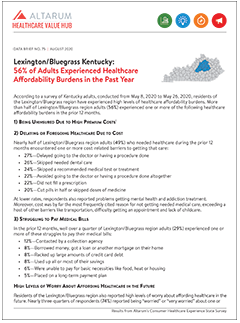Lexington/Bluegrass Kentucky: 56% of Adults Experienced Healthcare Affordability Burdens in the Past Year
According to a survey of Kentucky adults, conducted from May 8, 2020 to May 26, 2020, residents of the Lexington/Bluegrass region have experienced high levels of healthcare affordability burdens. More than half of Lexington/Bluegrass region adults (56%) experienced one or more of the following healthcare affordability burdens in the prior 12 months.
1) Being Uninsured Due to High Premium Costs1
2) Delaying or Foregoing Healthcare Due to Cost
Nearly half of Lexington/Bluegrass region adults (49%) who needed healthcare during the prior 12 months encountered one or more cost-related barriers to getting that care:
- 27%—Delayed going to the doctor or having a procedure done
- 26%—Skipped needed dental care
- 24%—Skipped a recommended medical test or treatment
- 22%—Avoided going to the doctor or having a procedure done altogether
- 22%—Did not fill a prescription
- 20%—Cut pills in half or skipped doses of medicine
At lower rates, respondents also reported problems getting mental health and addiction treatment. Moreover, cost was by far the most frequently cited reason for not getting needed medical care, exceeding a host of other barriers like transportation, difficulty getting an appointment and lack of childcare.
3) Struggling to Pay Medical Bills
In the prior 12 months, well over a quarter of Lexington/Bluegrass region adults (29%) experienced one or more of these struggles to pay their medical bills:
- 12%—Contacted by a collection agency
- 8%—Borrowed money, got a loan or another mortgage on their home
- 8%—Racked up large amounts of credit card debt
- 8%—Used up all or most of their savings
- 6%—Were unable to pay for basic necessities like food, heat or housing
- 5%—Placed on a long-term payment plan
High Levels of Worry About Affording Healthcare in the Future
Residents of the Lexington/Bluegrass region also reported high levels of worry about affording healthcare in the future. Nearly three-quarters of respondents (74%) reported being “worried” or “very worried” about one or more of the following topics: affording nursing home and home care services (59%); health insurance becoming too expensive (57%); cost of a serious illness or accident (56%); costs when elderly (55%); prescription drug costs (48%); cost of needed dental care (42%); and losing health insurance (37%).
Dissatisfaction with the Health System and Support for Change
Residents of the Lexington/Bluegrass region were extremely dissatisfied with the health system. Over three-quarters (77%) agreed or strongly agreed that “the system needs to change,” while just 28% agreed or strongly agreed that “we have a great healthcare system in the U.S.”
Respondents do see a role for themselves in solving problems. They reported actions they have already taken, like researching the cost of a drug beforehand (57%), as well as actions they should be taking—69% believed that taking better care of their personal health is one of the top things they can do personally to address affordability.
But, in far greater numbers, they saw a role for their elected representatives. Examples of strategies that received support across party lines are presented in Table 1.
The high burden of healthcare affordability, along with high levels of support for change, suggest that elected leaders and other stakeholders need to make addressing the cost of healthcare a top priority. Annual surveys can help assess whether or not progress is being made.

Note
1. We received too few responses at the regional level to provide a reliable estimate for this statistic, but these respondents are included in the overall “burdened” population.
For survey methodology and state-wide data, see www.healthcarevaluehub.org/kentucky-healthcare-survey.







